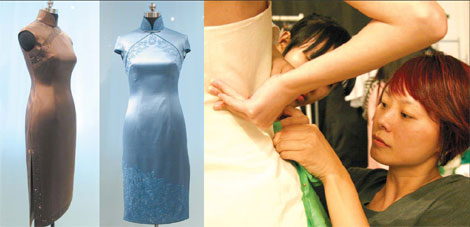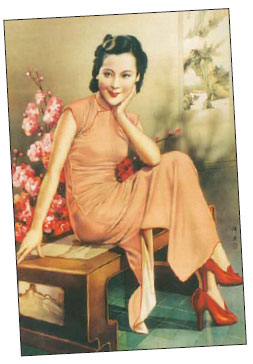Style
Fit for fashion
Updated: 2010-12-10 12:56
By Wang Jing (China Daily European Weekly)
 |
|
Tailor-made qipao can cost as much as 2,200 euros and take three weeks |
Traditional dresses are becoming High-End favorites with price tags to match
In classic movies and in those iconic 1920s Shanghai posters, the typical Chinese woman is seen stylishly dressed in cheongsam or qipao. The qipao integrates Chinese traditional embroidery with Western elements and has now taken a foothold in the luxury market.
A.Helen Fashion Studio is one of Beijing's emerging studios where tailor-made qipao or bespoke cheongsam are priced between 1,800 yuan (205 euros) and more than 20,000 yuan (2,260 euros).
"Actually, there is no ceiling price for a tailor-made cheongsam. If the client wants more quality and wants more detail, the price will be higher," says Helen Hu, the owner of the studio.
Hu, who continued her studies in Canada for three years after graduating from the Beijing Institute of Fashion Technology, launched her own studio in 2006.
 |
| Classic qipao worn in Shanghai during the 1920s. Provided to China Daily |
On the wall of the studio are photographs of the nation's top entertainment stars and celebrities wearing cheongsam designed by her.
"Our clients range from diplomats and officials to entertainment stars and business executives. There are also ordinary consumers," Hu says. "About 40 percent of our clients are foreigners and the figure was even higher before the financial crisis, roughly 50 percent."
According to Hu, an advance appointment is the starting point to owning a custom-made qipao.
The next step is deciding on suitable fabric, color, style, embroidery patterns and detail treatments before numerous specific measurements are taken down.
After two fittings and follow-up alterations, the whole process can take up to 20 days and involves about 10 skilled workers and designers.
Cheongsam has a proud tradition and the tailor-making service has a long history.
In the Beijing-based Ruifuxiang Silk, one of China's most famed traditional apparel producers, a tailor-made qipao costs at least 1,100 yuan.
"If the client demands more embroidery on the cheongsam or requires some special treatments, the price will go up to 20,000 yuan or even higher," says Zou Qiuming, the chief designer of Ruifuxiang.
Zou is in her early 60s and has devoted 32 years to her career. She started as a student in a fashion designing school and then became an apprentice under a master tailor.
Qipao were made to order as early as the Qing dynasty (1636-1911), according to one of Zou's colleagues surnamed Ma.
"The difference is that bespoke cheongsams were restricted to women with high social or economic status at that time, but now our clients include officials, social celebrities and ordinary people as well," Ma says. "The style has also changed a lot."
According to Ma, the original cheongsam was wide and loose, covering most of a woman's body.
Over time, the once baggy qipao became more form fitting and revealing and this style flourished in Shanghai during the 1920s and became famous around the world thanks to the qipao-wearing models, who were the focus of colorful calendars made in Shanghai.
Now, modernized cheongsam are influenced by Western fashion designs, concepts and trends.
"Many Western fashion elements have been introduced to traditional cheongsam, as is embodied by those high-necked, backless and sleeveless cheongsam," Zou explains.
Zou says a well-made cheongsam can fit any occasion and the dresses are a good choice for formal ceremonies, meetings and parties.
Although qipao can cost as low as 120 euros, some of China's super rich are known to spends thousands.
"The price results from fabric quality, embroidery patterns and skills and other special detail requirements from the clients," Zou explains.
"The embroidery for those types is generally more complicated and sophisticated. Or the clients may have some special requirements on the neckline, in the embroidery pattern, or on the knotted buttons."
However, the high price of luxury traditional dresses does not discourage qipao enthusiasts.
"First, people are now better off comparatively. They can spend more money on fashion," Helen Hu says.
"For the other, it is not just a matter of a dress. A bespoke cheongsam is not only more fitting and delicate, compared with a ready-made one.
"It can also provide you with an elegant attitude toward life. Your behavior has to match the high-quality cheongsam you wear. It is a reflection of your personality, taste and even your status."
Currently there is little advertising for cheongsams or for tailoring services.
"We have always been keeping a low profile," Ma from Ruifuxiang says.
"I believe the solid quality and skills, together with our long-standing commitment to be honest and professional, are attractive enough to our potential clients."
However, Hu has her own promotional ideas.
"I am now giving some lectures on how to manage the closet, and how to find a good match with clothes," she says.
"Knowledge like this is very helpful for my clients. Through helping them, my brand, as well as me as a designer, will get better known. What's more, the bilateral trust built in this process is the key point. That's where I begin and hope to end."
She also plans to integrate fashion shows, cheongsam shows included, into her studio in the near future.
As for future expectations, Hu hopes designers and emerging brands can be given more support.
"I wish we can get more public attention as emerging brands."
"Most importantly, most individual designers for those luxury brands in Europe and the US are backed by financial giants, especially in their early days." She says.
"But now in China, we see no such signs."
E-paper

Ear We Go
China and the world set to embrace the merciful, peaceful year of rabbit
Preview of the coming issue
Carrefour finds the going tough in China
Maid to Order
Specials

Mysteries written in blood
Historical records and Caucasian features of locals suggest link with Roman Empire.

Winning Charm
Coastal Yantai banks on little things that matter to grow

New rules to hit property market
The State Council launched a new round of measures to rein in property prices.
